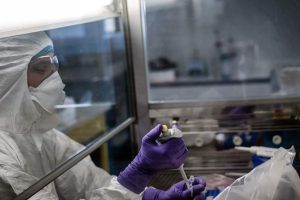In three weeks, the coronavirus has killed more people in China than SARS did in nine months. Those kinds of numbers are troubling but biotech firms are leading the charge in the battle against the world’s most feared virus. As it spreads, the risk in China is "very high," while the risk for the rest of the world remains "high."
“At least a dozen companies have informally or formally announced vaccine or drug development initiatives,” said Needham analyst Alan Carr. “It appears at least a few programs will have moved into clinical testing within a few months.”
These programs range from approved drugs available for other viral infections to unapproved drugs that have initially been developed for other viruses as well as new monoclonal antibodies, and new vaccines.
Though Carr warns that "vaccine development timelines vary based on technology, but significant infrastructure may be needed and they provide no help for patients already infected.”
In January, Inovio Pharmaceuticals announced it was in the process of developing a vaccine against the new virus. Analysts warn that these commercial treatments can be years away. Moderna has also indicated that it is working on a potential vaccine for the coronavirus.
“Moderna has a potential benefit over traditional vaccine makers in that once it has the sequences that code for the most immunogenic part of the virus’ surface proteins, or antigens, management can rapidly make a clinical development candidate,” said Morgan Stanley analyst Matthew Harrison in a note.
Regeneron is another biotech giant throwing its hat in the ring. The company says its screening technology could be used to produce therapeutic antibodies against the coronavirus. “During the Ebola outbreak, Regeneron was able to move from development to validation of its therapeutic candidate in 6 months,” Harrison noted.
CureVac, Johnson & Johnson, Novavax, and Vaxart are currently working on their own vaccine programs.
Seven types of coronaviruses that infect humans have been identified. Though, the coronavirus is a new strain, discovered in December 2019. Formally known as 2019-nCoV, it causes fever, cough, muscle pain and fatigue. Experts are warning that this virus often leads to pneumonia.























